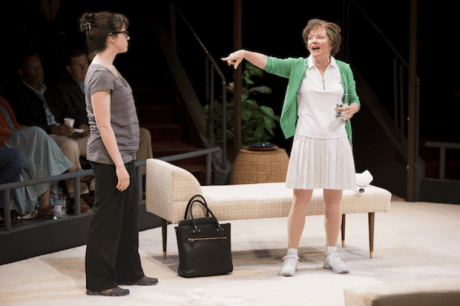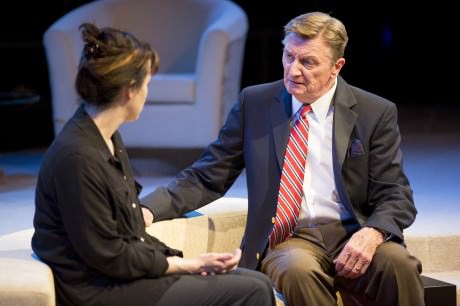Unhappy Family Fights It Out at Arena Stage
Other Desert Cities, the last play in the 2012-2013 season at Arena Stage, takes place on wall-to-wall white carpet in a living room furnished with circles and rectangles by people who want you to come, but don’t want you to stay. In the middle of the set, which was designed by Kate Edmunds and which steals the show, there’s a sunken seating area with a circular fireplace surrounded by rectangular sofas — an architectural feature that appeals to your emotional geometry even as it makes the room impossible to use. A house to look at, not to live in, which helps explain the enigmatic title.

“You know that sign on the highway where you can either turn off for Palm Springs or keep going to ‘Other Desert Cities?’” Brooke asks her brother. “I’m always tempted to just keep on driving, you know.”
After delivering that line, Emily Donahoe, who plays Brooke Wyeth, waits for a laugh, which the audience provides — not real laughter but the sound we make that stands for laughter, because we’ve heard our cue and we want to be polite. Then Donahoe goes on. That pattern repeats itself through most of the play.
“Hey, people need to laugh today,” says Brooke’s brother, Trip. “It’s all so goddamn serious and, you know, horrible out there. We could all get anthraxed any minute — people need to laugh!”
Maybe that explains it.
Brooke has come back to Palm Springs from Sag Harbor to give her parents a look at her new memoir before sections of it appear in The New Yorker, in advance of its publication by Knopf. Lyman and Polly Wyeth show poorly in Brooke’s book because they’re people who prefer the kind of spiffy chairs that no one really wants to sit in, even their own children, one of whom committed suicide years ago, Brooke believes, because Lyman slapped him when he asked for help. She’s been troubled by her brother’s death for years, so troubled that she finally had to tell the story so she could let it go, and she wants her parents’ blessing on the portrait of their family she has drawn, though it seems both unlikely that she would get it and illogical that she should want it.
Larry Bryggman, who plays Lyman, is known to millions for his work in As the World Turns, One Life to Live, Law & Order, The Good Wife, and other TV shows, and his stardust may account for the audience’s glow. At first Bryggman seems to be shouting, as if he’s not sure people in the back can hear him — or actors on the far side of the stage — but later in the play he finds a better voice and sometimes seems to have some fun.
His wife, Polly, is the character we’re suppose to despise, but Helen Carey plays her with deliberate craftsmanship that makes it look like you’re watching a skillful actor play a despicable character. She seems to be watching the character herself. When she pauses for a laugh, you can almost see Helen take a step away from Polly, joining the chucklers for a second.
Scott Drummond’s Trip is the easiest character to like, in part because his timing seems natural, and he keeps his attention on the characters with whom he’s supposed to be interacting, whereas the other actors are usually trying to tickle us. I presume that Director Kyle Donnelly instructed them to do that: play to the audience, wait for the laugh. She often keeps the actors far away from one another and makes them shout back and forth across that round pit in the middle of the room. Maybe that distance on stage is supposed to represent the distance between these people.
And maybe the pauses for laughter are supposed to remind the audience of the medium America loves best: the television, whose viewers maybe have a sweet tooth for dialog that’s written in block letters, with a magic marker, and a hunger for dramatic revelations that resolve what seemed to be the mysteries of life.

The author of this play, Jon Robin Baitz, has written successful screenplays for Miramax and dramas for ABC, and his work has earned several significant awards, including a nomination for the Pulitzer Prize. Other Desert Cities has won both the Drama League Award and the Outer Critics Circle Award, so it’s clear that the play resonates well with many people.
I must have a tin ear.
Running time: two hours with one intermission.
Other Desert Cities plays through May 26, 2013 at Arena Stage at the Mead Center for American Theater – 1101 6th Street SW, in Washington DC. For tickets, call the box office (202) 488-3300, or buy them online.





